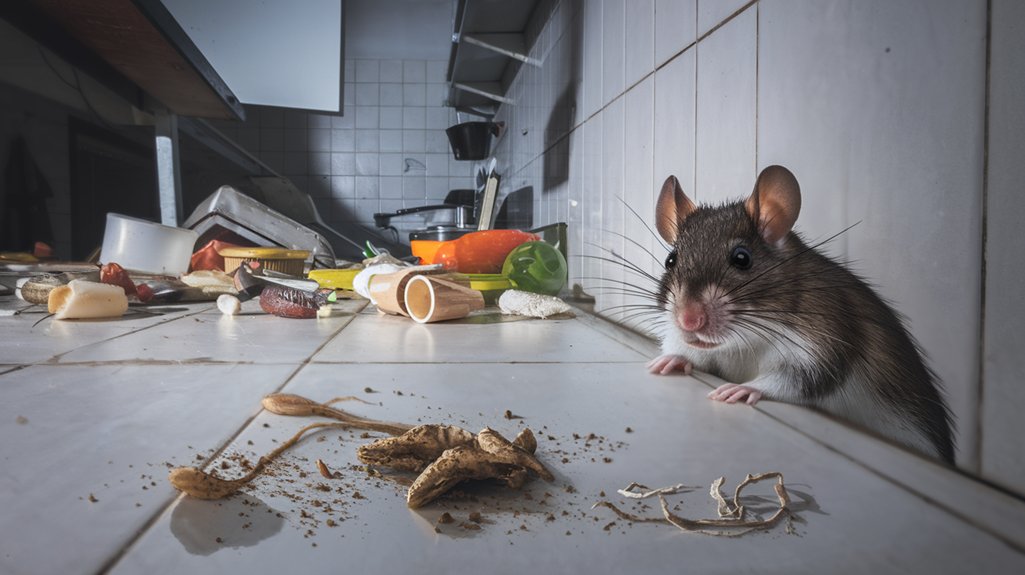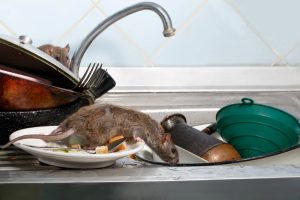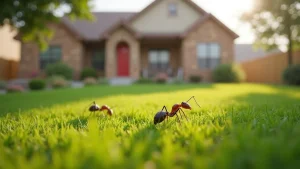Are you aware of the health risks posed by rodents in your home? These pests can carry diseases that may lead to serious health issues, often without you even realizing it. Their droppings and urine can contaminate your living space, putting you and your family at risk. Knowing the signs of an infestation and how to protect yourself is crucial. Let’s explore what you need to know to keep your environment safe.
Common Diseases Transmitted by Rodents
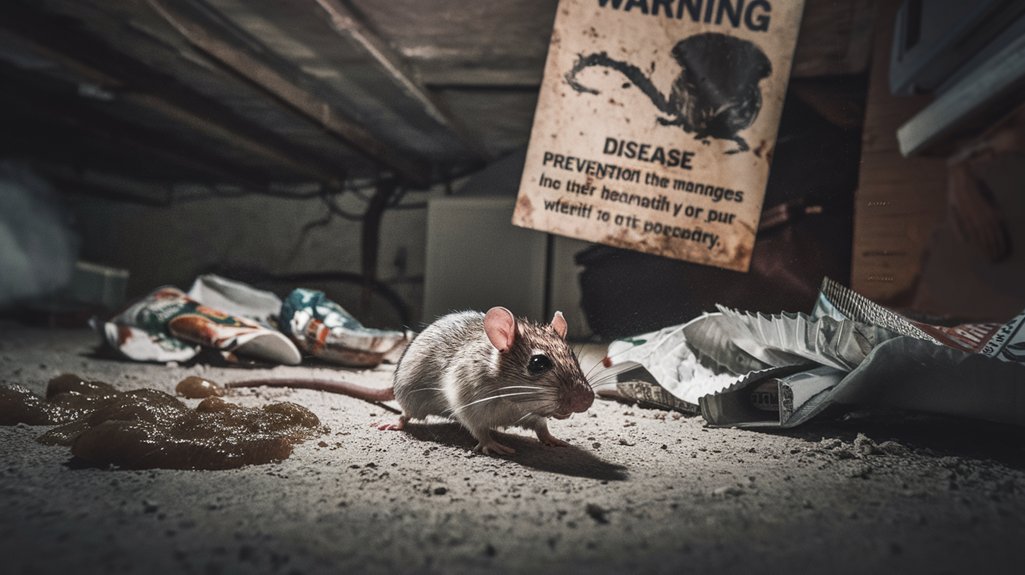
When you think about pests in your home, it’s easy to overlook the health risks posed by rodents. However, these critters can be carriers of serious diseases.
One notable concern is Hantavirus risks, which can lead to severe respiratory issues if you inhale contaminated particles. You mightn’t realize that even a small amount of rodent droppings can put you at risk.
Then there’s Leptospirosis transmission, a bacterial infection that can occur through contact with water or soil contaminated by rodent urine. Symptoms can range from mild flu-like signs to severe illness.
Recognizing these dangers is crucial, as being proactive in preventing rodent infestations can protect your health and well-being.
Don’t underestimate the potential impact of rodents in your living space.
Plant Health Care ensures thriving gardens. Learn more from Colorado State University Extension.
How Rodents Contaminate Food Supplies
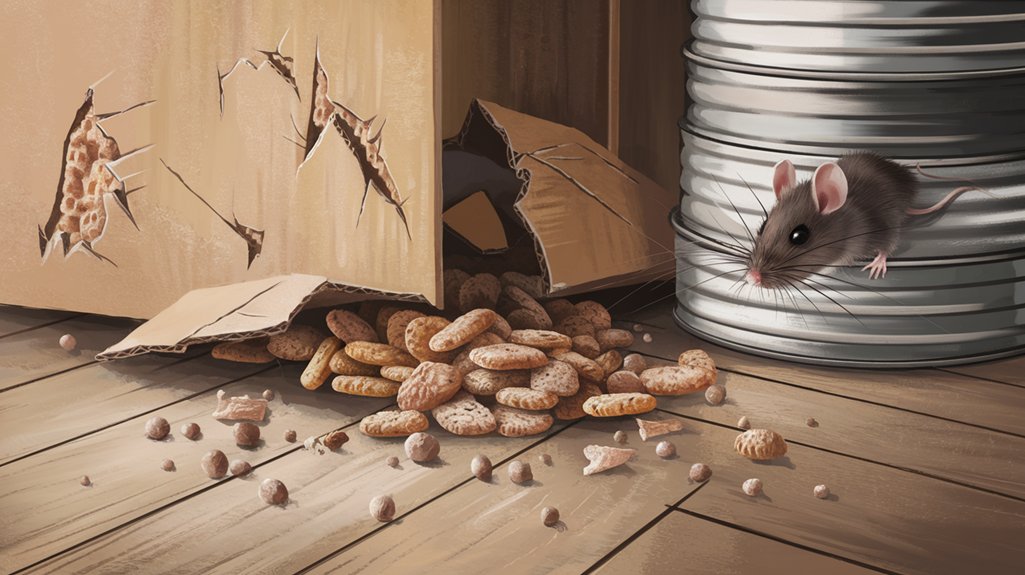
Rodents can contaminate food supplies in several alarming ways. Their presence poses serious risks, especially when it comes to foodborne pathogens.
Here are four ways they can compromise your food safety:
- Droppings: Rodent feces can carry harmful bacteria and viruses.
- Urine: Even small amounts can contaminate food surfaces and supplies.
- Chewing: Rodents gnaw on food packaging, exposing contents to contamination.
- Nesting: They can create nests in stored food, further spreading pathogens.
To protect yourself, maintain strict sanitation practices in your kitchen and food storage areas.
Regularly inspect for signs of rodent activity, and ensure food is stored in sealed containers. Staying vigilant can help safeguard your health against these pests.
The Impact of Rodent Droppings and Urine
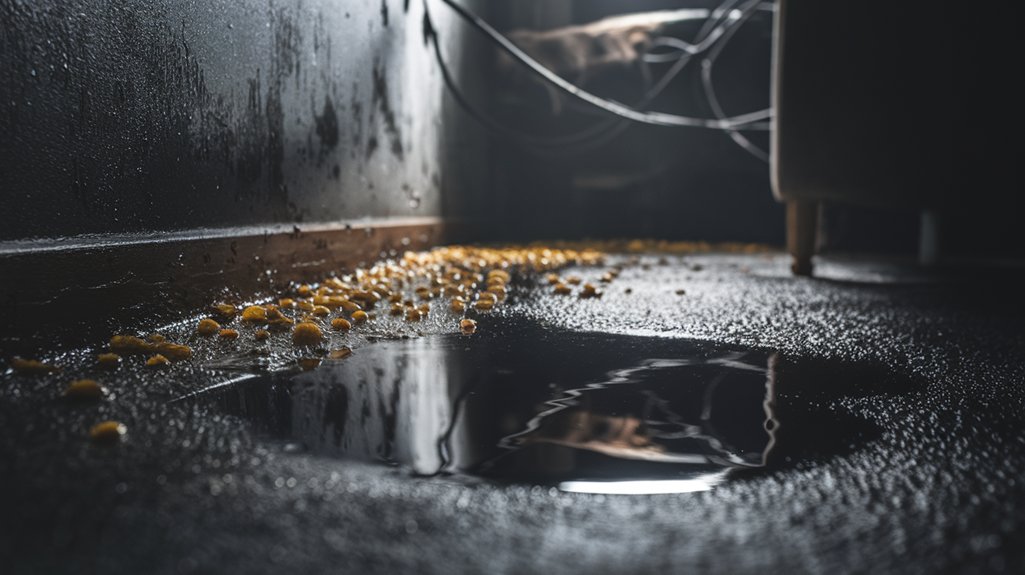
Although often overlooked, the droppings and urine of rodents can have a significant impact on your health. Dropping exposure and urine contamination can lead to serious illnesses, including hantavirus and leptospirosis. When you come into contact with these contaminants, whether through inhalation or direct contact, you risk developing severe respiratory issues or other health problems.
| Health Risk | Source |
|---|---|
| Hantavirus | Rodent droppings |
| Leptospirosis | Urine contamination |
| Salmonella | Contaminated surfaces |
| Allergic reactions | Droppings exposure |
| Gastrointestinal issues | Urine exposure |
To stay safe, it’s crucial to clean areas prone to infestation and ensure proper sanitation.
Signs of a Rodent Infestation
If you notice unusual signs around your home, it might be time to investigate a potential rodent infestation. Here are some key warning signs to look out for:
- Droppings: Small, dark pellets near food sources or nesting areas indicate activity.
- Gnaw Marks: Look for bite marks on furniture, wires, or walls; rodents often gnaw to keep their teeth trimmed.
- Nesting Materials: Shredded paper, fabric, or insulation can signify nesting habits in hidden corners.
- Strange Noises: Scratching or scurrying sounds at night may point to rodents moving around.
Being aware of these signs can help you identify a rodent problem early, ensuring you take action before it escalates.
Stay vigilant and proactive in maintaining a rodent-free environment!
Effective Prevention and Control Measures
To keep rodents at bay, it’s essential to implement effective prevention and control measures in your home. Start by using rodent proofing techniques, such as sealing gaps and holes in walls, floors, and around pipes. Properly store food in airtight containers, and keep your kitchen clean.
Incorporate natural repellents, like peppermint oil or vinegar, to deter rodents from entering your space. Regularly inspect your property for signs of intrusion and set traps if necessary.
| Action | Description |
|---|---|
| Rodent Proofing Techniques | Seal gaps, store food properly |
| Natural Repellents | Use peppermint oil, vinegar |
| Regular Inspections | Check for signs of intrusion regularly |
Frequently Asked Questions
How Can I Tell if My Neighbor Has a Rodent Problem?
To tell if your neighbor has a rodent problem, look for signs like droppings, gnaw marks, or nests. You might also notice unusual rodent behavior, such as increased activity during the day or strange noises at night.
Are Certain Rodent Species More Dangerous Than Others?
Certain rodent species, like Norway rats and house mice, pose a higher risk due to their potential for disease transmission. It’s crucial to stay informed about these high-risk species to protect your health effectively.
What Time of Year Are Rodent Infestations Most Common?
Rodent infestations are most common during the fall seasons as they seek shelter from the cold. As winter months approach, they invade homes more frequently, looking for warmth and food. Stay vigilant during this time.
Can Pets Help Detect Rodent Infestations?
Yes, pets can help detect rodent infestations. Their keen senses and unique pet behavior allow them to notice unusual sounds or smells, making them valuable allies with impressive detection skills in identifying potential rodent activity around your home.
How Do Rodents Affect Mental Health?
Rodents can increase anxiety and stress, leading to what’s known as rodent anxiety. The constant worry about infestations can disrupt your daily life, affecting your mental well-being and overall peace of mind.
To keep yourself and your family safe from the risks posed by rodents, it’s crucial to stay vigilant. Regularly inspect your home for signs of infestations and maintain strict sanitation practices. Seal any gaps and store food in airtight containers to minimize attractants. By taking these proactive measures, you can effectively prevent rodent-related health issues and protect your living environment. Don’t wait for an infestation—act now to ensure your home remains a safe haven.
Plant Health Care with Above & Beyond Services keeps your Denver trees and shrubs thriving. Call (720) 806-6378 or visit Above & Beyond Services for free quotes on plant care, pest control, and more.
Key Takeaways
- Rodents can transmit serious diseases like hantavirus and leptospirosis through droppings and urine, posing significant health risks.
- Inhalation of contaminated particles from rodent droppings can lead to respiratory issues, while urine exposure can cause flu-like symptoms.
- Signs of rodent infestations include droppings, gnaw marks, and nesting materials, which indicate the need for immediate action.
- Preventative measures such as sealing gaps, proper food storage, and using natural repellents can help keep rodents away.
- Regular inspections and traps are essential for controlling rodent populations and protecting your health.

